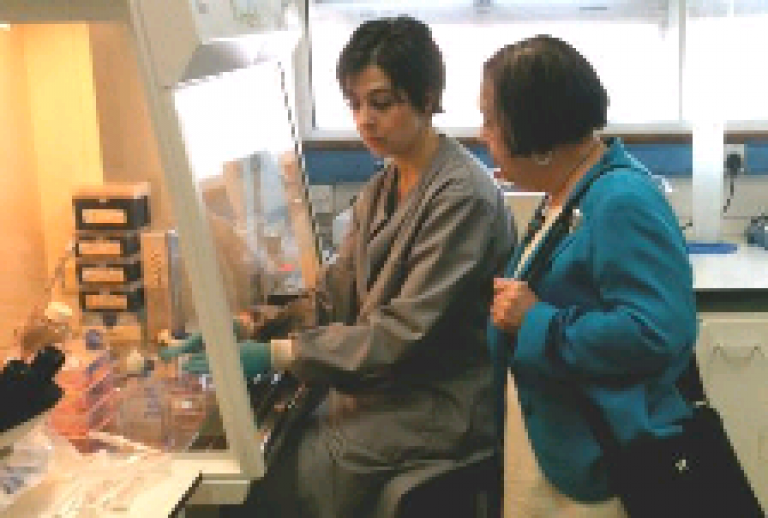Parliamentary group visit the UCL Institute of Neurology
25 May 2012
Members of the All-party Parliamentary Group on Parkinson's disease visited the UCL Institute of Neurology today to see at first hand the research being done at UCL to understand the causes of Parkinson's and to develop novel treatments for the disease.

Research into Parkinson's disease at the Institute spans fundamental research into the genetic origins of the disease, cellular studies of neuronal death and clinical interventions aiming to improve the life of people with Parkinson's. The visit, co-organised with the charity Parkinson's UK, brought together parliamentarians, patients and researchers.
Baroness Gale, chair of the group, said:
"this was a fascinating opportunity for members of the Parliamentary Group to see some of the research that's being done into the causes and treatments for Parkinson's. This gave me an insight into how much progress has been made, but also what still needs to be discovered".
Professor John Hardy, Head of the Department of Molecular
Neuroscience at the UCL Institute of Neurology and a leading researcher
into the genetics of Parkinson's, welcomed the visit:
"Parkinson's disease affects 127,000 people in the UK
directly as well, of course, as affecting their families and friends. It
was gratifying to have the all party group come to the Institute and to
see the enthusiasm and commitment of the young researchers and
clinicians we have working on the disease. It is also very good for us
as researchers to meet and talk to people personally affected by the
disease".
Professor Nick Wood, Galton Chair of Genetics and
Consultant Neurologist at the National Hospital for Neurology and
Neurosurgery, said:
"Parkinsons is a common neurodegenerative disease and there is a pressing need for research to understand the causes and develop therapies. It is therefore vital that policy makers have insights into the progress being made and the potential for therapeutic intervention to help modify and ultimately cure this devastating disease."
The UCL Institute of Neurology is the lead partner of the UK Parkinson's disease consortium, funded by a £5.9 million award from the Wellcome Trust and the Medical Research Council as part of their neurodegenerative diseases initiative.
UCL is Europe's research powerhouse in neuroscience - ranked second in the world, and first in Europe, in neuroscience and behaviour by Thomson ISI Essential Science Indicators, and with more than twice as many publications and citations as any other European institution.
Neuroscience is a strategic priority for UCL, spearheaded
by the new Faculty of Brain Sciences. UCL recently received a £20million
grant from the Wolfson Foundation to establish The Leonard Wolfson
Experimental Neurology Centre at Queen Square, which will be dedicated
to the understanding and treatment of neurodegenerative diseases. This
is the largest single award ever made by the Foundation and one of the
largest philanthropic donations in UCL's history. The Centre will
accelerate the development of treatments and identify future therapeutic
targets for neurodegenerative diseases, with the aim of earlier
intervention for patients.
Image: Baroness Gale, chair of All-Party Parliamentary Group on Parkinson's,
talks to Dr Claudia Manzoni, a postdoctoral researcher in the Department of
Molecular Neuroscience
Links:
 Close
Close

